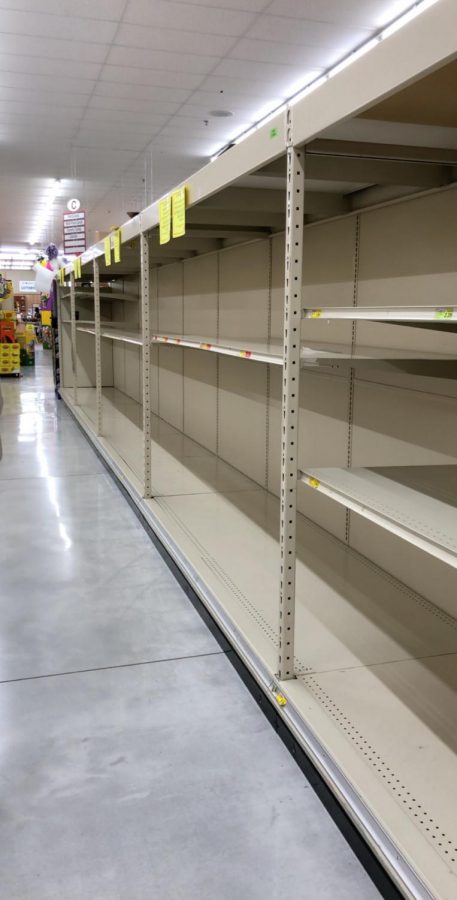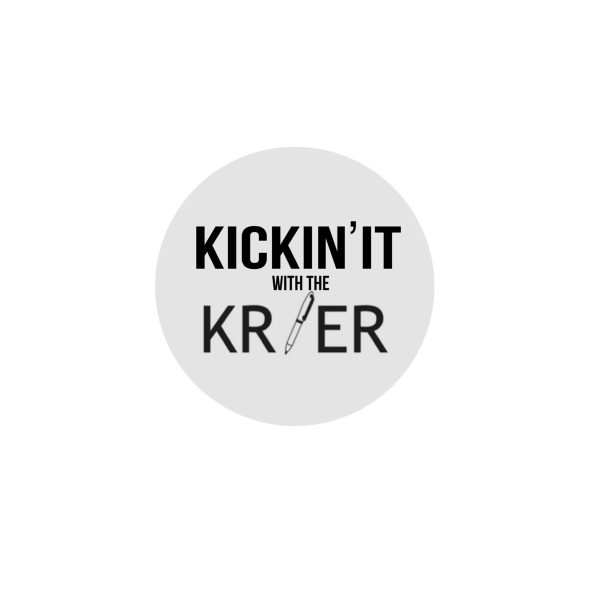Resisting the Urge to Hoard Supplies
Photo By Gianna Provenzano
Empty isles after panic buyers at North Aurora Woodmans.
During the coronavirus pandemic, stores are selling out shelves of just about everything: bread, water, cleaning supplies and the most popular item, toilet paper. These items seem like a necessity in the midst of a mass panic like this, but stocking up on cases of water and multiple loaves of bread at a time is not as necessary as the public is making it seem. Plenty of homeless people and individuals in poverty need these products more than the people buying them in bulk, and the virus does not affect many objects (such as water supply).
In Illinois alone, there are approximately 10,643 people experiencing homelessness as of 2018 and only about 6,939 emergency shelter beds available, according to endhomelessness.org. As of 2017, 39.7 million Americans are in poverty and cannot afford the essential needs for life, which includes many of the items middle and higher class individuals are hoarding in their homes. Yes, some people are buying some of the aforementioned items and giving them away to less fortunate people, but not everyone on the street is getting that opportunity to receive a gift from a stranger. The fact is, this pandemic will not be lasting for years and years if we are able to flatten the curve as has happened in places like China and South Korea, and people are buying off shelves as if they are going to be trapped inside their homes forever. If you think buying eight six-packs of toilet paper is what you need to self-isolate for a week or two, then it might be time to see a doctor.
Stocking up is also completely unnecessary during this time because the virus does not affect many of the products selling out. Yes, bacteria can live on food and surfaces, but cleaning products can still be used sparingly (using more does not clean your surface better, it just wastes your product), and having nine loaves of bread increases the likelihood that some of them will grow mold and go bad. Canned goods can be preserved for a long time, but if you already have a ton of beans and tomato paste for that chili you keep meaning to make, maybe you do not need to buy another can. Buying bottled water is unimportant, as well, according to Sarah Hansen of Forbes, who interviewed Nevin Cohen, a professor at the CUNY Graduate School of Public Health. The virus does not contaminate water supply. A sink is just as good as a non-biodegradable plastic bottle, so being eco-friendly and leaving something for the poverty-stricken people, along with not being in the supermarket for a prolonged period of time, is a plus.
“The risk of going to a crowded supermarket or big box retailer to buy water and exposing oneself to a large number of other shoppers is greater than [the risk of] using water from the tap,” Cohen said.
Saving money – or not – is also a factor in this issue of people overstocking. Your supplies will not last forever, but spending every dime left in the piggy bank for something you can only use once will leave a person with some regret. Especially in the midst of companies shutting down and sending workers home unpaid until they open again, money can be a huge issue even for the higher and middle classes. According to Grow By Acorns + CNBC, to avoid overspending, consumers should buy foods they like as opposed to foods with a long shelf life, and they should stick to soap instead of hand sanitizer. Aditi Shrikant, a writer for Grow, also says to not buy paper towels and to save your dollars by using a dish rag. In addition, you should make a plan to avoid buying things you do not need.
“If your family eats cereal every morning, put that on the list. When you get to the store, cereal might be gone, so put back-up foods such as oatmeal or granola on your list. Picking out possible substitutions in advance will keep you from buying random foods you won’t end up eating. But since the coronavirus is not a diuretic disease, there is no need to buy more than you usually would for a two-week supply,” Shrikant said.
Please be generous. Others are in more need than you are. Stocking up as if the zombie apocalypse is finally here is doing nobody any good, because once this is over, your surplus will be taking up unnecessary space in your house and you will regret that trip you took to the store. It is never too late to give back, but do not wait until the virus cools down. Many people have died and will continue to die due to the lack of essentials and healthcare. If you cannot buy them a trip to the hospital, you can at least give them an extra few bottles of water and some bread to last them a few days more.

Position: Production Executive
Graduation Year: 2022
My Future Goals: My goal is to study film and possibly minor in women's studies.
Fun Fact...








